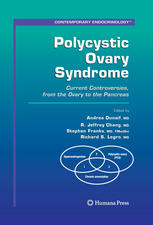

Most ebook files are in PDF format, so you can easily read them using various software such as Foxit Reader or directly on the Google Chrome browser.
Some ebook files are released by publishers in other formats such as .awz, .mobi, .epub, .fb2, etc. You may need to install specific software to read these formats on mobile/PC, such as Calibre.
Please read the tutorial at this link: https://ebookbell.com/faq
We offer FREE conversion to the popular formats you request; however, this may take some time. Therefore, right after payment, please email us, and we will try to provide the service as quickly as possible.
For some exceptional file formats or broken links (if any), please refrain from opening any disputes. Instead, email us first, and we will try to assist within a maximum of 6 hours.
EbookBell Team

0.0
0 reviewsAll four editors of this title are extremely prominent in the field of PCOS. Although they are all U.S.-based, they are internationally renowned. The book includes the latest diagnostic criteria for PCOS, and comprises the most up to date information about the genetic features and pathogenesis of PCOS.
The diagnostic criteria for PCOS took shape in 1990 following an NIH conference co-organized by Dr. Dunaif, resulting in her classic volume, Polycystic Ovary Syndrome (1992). That title recommended diagnostic criteria of hyperandrogenism and chronic anovlulation with the exclusion of specific disorder of the ovary, adrenal, and pituitary. These criteria dominated the field but were revised in 2003 by a working group of international experts at a conference in Rotterdam. Since then, it has become increasingly clear over the past several years that PCOS is a complex genetic disease resulting from the interaction of susceptibility genes and environmental factors. This volume critically reviews the methodological approaches and the evidence for various PCOS susceptibility genes. Additional familial phenotypes of PCOS and their potential genetic basis are also discussed. In all, this title is comprehensive and replete with the latest in expert recommendations on PCOS. This expert opinion remains critical to guiding practice in PCOS because sufficient data for evidence-based guidelines remains scarce.